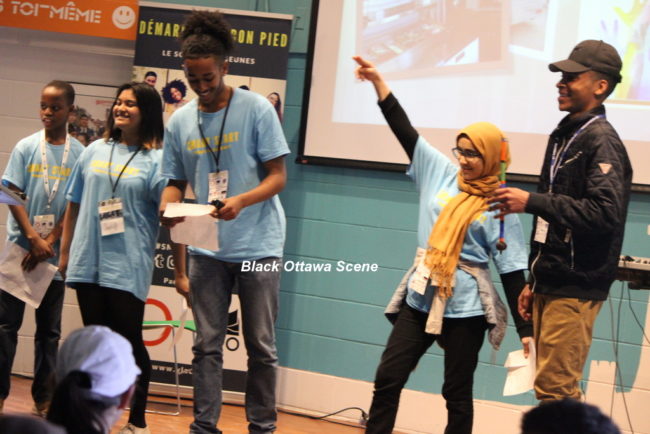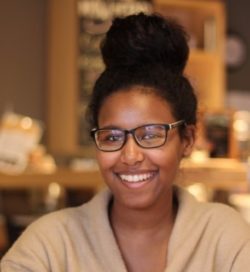
Lessons in Allyship: Black History Ottawa and YLAC’s successful SMART START summit
12 & 13 May
by Ililli Ahmed
Established in 2016, the Young Leaders Advisory Council (YLAC) was founded on the principle of creating safe spaces in which to engage and mentor young people. With this in mind, in order to truly give youth the “seat at the table” that we deserve, the council initiated their SMART START event in 2017, which gathered young Ottawans aged 13-24 to participate in a weekend aimed to empower and educate. Undoubtedly, last year’s events were a huge hit, and their goal to amplify youth voices while respecting our diversity was reflected in their workshops; this year, however, YLAC took their facilitations to the next level by focusing on using one’s understanding of intersectionality and applying it to allyship.
Having applied to be a delegate at the May 12th event– a position open to anyone between 13-17 years old– my day began bright and early as I hopped onto one of the accessible shuttle busses provided by YLAC and sponsors and headed to the Terry Fox Youth Centre. After enjoying breakfast and meeting my fellow delegates and older ambassadors, the council and the 150 attendees began the weekend with a land acknowledgment in recognition of unceded and unsurrendered Algonquin land. Special guests also graced the stage: June Girvan, the current president of Black History Ottawa, spoke of appreciating one’s heritage and celebrating the necessity of teamwork. It is equally important to note that SMART START was created by Black History Ottawa, in partnership with YLAC, as a part of Black History Ottawa’s commitment to youth leaders. Following Ms. Girvan, Mathieu Fleury, the youngest elected councillor in Ottawa, told the crowd what many of us know to be true: never underestimate the power of young people. And although he did not mention his privilege as a white man with regards to the potential ease of his election, he did mention the barriers placed on youth in a generalized sense, as we carve our paths in adult dominated areas.
The day continued with a very resonating workshop, “Smart Start 101:” it is here that YLAC’s excellent organization and attention to detail was made evident. Among an array of incredible facilitators, I was lucky enough to be in a group run by old friend and co-founder of YLAC, Danait Mehreteab. Beginning with a fun warm-up game, Danait ensured that the group agreed on a set of community agreements to uphold a safe space throughout the session. The 20 delegates and handful of ambassadors present unanimously agreed to respect one another, refrain from judgement, remain open-minded and recognize the uniqueness of everyone’s diverse experiences, in order to co-create knowledge.
Following this, delegates took the time to list what parts of identity are visible and invisible, and discussed the essence of diversity. This conversation made note of things such as diversity in culture, age, race, appearance, class, sexual orientation, language, gender identity, ability and religion, thus bringing forth an important concept: the unique intersections of one’s identity can and will shape the way they view the world. To put this newfound understanding into action, delegates did a tower building exercise. Each team was given a bag of popsicles sticks and playdough and scrambled to construct the tallest tower, which Danait would test within two minutes. Here’s the kicker: unbeknownst to one another, each group had a different amounts of supplies, some with more resources than others. In addition to this, Danait tested each team’s structure with increasingly heavier objects, making it difficult to pass her test as she circulated.
Of course, the exercise proved to be a real-life example of the realities of inequity, and how people naturally respond to it: interestingly, those with fewer resources took to breaking popsicle sticks in half and scrounging their playdough, while those with more resources automatically assumed that everyone around them had the same amount of provisions. All things considered, this is also a clear testament to allyship and a recognition of one’s privilege: the sticks and playdough could, for example, represent financial, educational, medicinal, racial or gender privilege. With this realization, delegates were eager to ask questions such as “is privilege a constant?” and “How can we use our privilege to be better allies?” As we learned, privilege depends on environments, since someone who is privileged in one regard may not be privileged in another. I can be an example of this: as a Black, Oromo, Muslim woman, I lack racial, ethnic and religious privilege while socially benefitting as a cisgendered, able-bodied and heterosexual person. Again, this is proof that privilege, due to its wide scope, is not guaranteed in every circumstance.
It was here that YLAC presented the long-awaited idea of allyship.To put it simply, an ally is someone who recognizes their privileges, validates experiences unlike their own, and amplifies the fight for equality of marginalized groups that they are not a part of. To my surprise and excitement, delegates began listing active examples of allyship such as:
- Showing up to rallies hosted by group’s that you do not belong to
- Supporting local businesses within marginalized communities
- Including land acknowledgements in presentations
- Speaking out against discriminatory attitudes and beliefs within your environment
As lunch loomed and the facilitation ended, the closing remarks circle almost brought tears to my eyes. Many delegates expressed that they felt humbled by the facilitation, while others felt that they finally recognized their privilege, and vowed to mobilize it as allies. On a personal note, the facilitation made me feel whole, since my intersection of identities can make me feel unbelievably lonely at times. But, in seeing YLAC’s success in mobilizing their delegates into becoming better allies, a part of me is comforted in recognizing that soon enough, I will no longer feel alone in the all-encompassing fight for equality.
To get involved with the Young Leaders Advisory Council, check out their website: http://www.ylac.ca/ and subscribe to their monthly newsletter.
About the writer

Youth Editor Ililli Ahmed is a 12th grade student who loves to listen to Frank Ocean, write articles and opinion pieces and watch “The Get Down.” In the past, she’s written for Radio-Canada, and is the youth editor for ‘Black Ottawa Scene.’ Ililli is also co-president of many clubs, such as her school’s Intersectional Feminism and Black History Month Club. You can contact her at [email protected].
